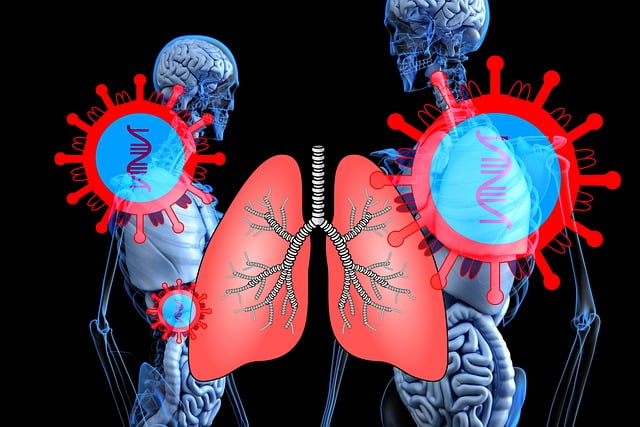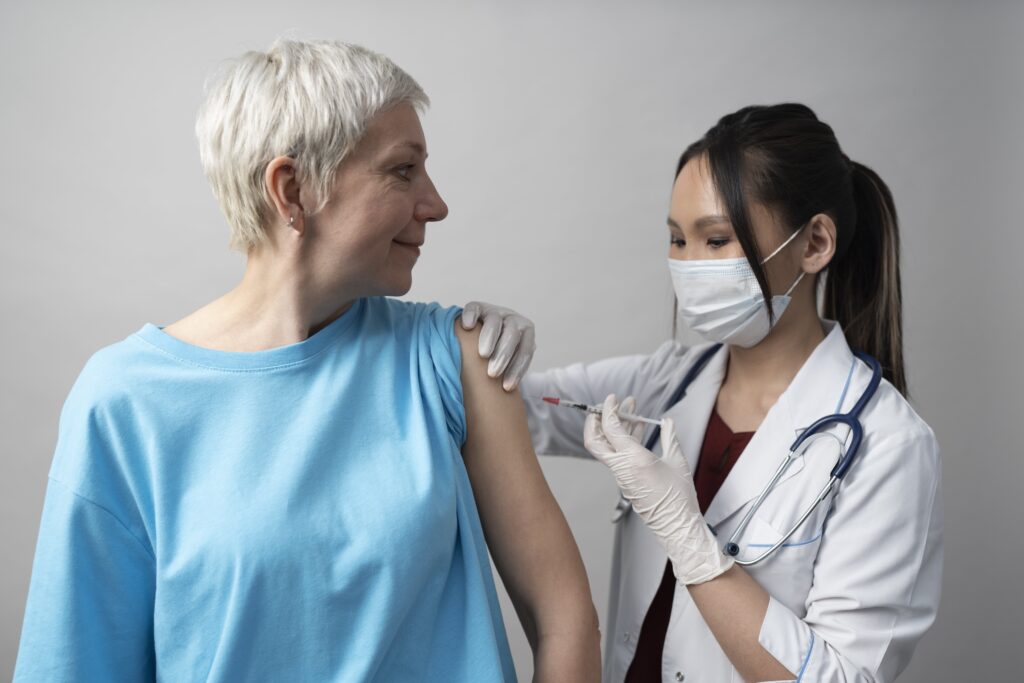Pink Eraser Breast Cancer Vaccine and all other Cancer vaccines have emerged as a groundbreaking approach in the fight against cancer, offering hope for both prevention and treatment. These vaccines, known as oncovaccines, are designed to either treat existing cancer or prevent its development. They work by stimulating the immune system to recognize and attack cancer cells, a process that holds immense potential in revolutionizing cancer care.
The Evolution of Cancer Vaccines: A Promising Frontier in Immunotherapy
Here we shall discuss on all the aspects regarding the Cancer Vaccines. How they work and help the patients to treat many kind of cancer.
Understanding Cancer Vaccines
Cancer vaccines come in two main types: preventive and therapeutic. Preventive vaccines target viruses that can lead to cancer, such as the human papillomavirus (HPV) and hepatitis B virus. By training the immune system to recognize and destroy these viruses, these vaccines play a crucial role in preventing certain types of cancer. On the other hand, therapeutic vaccines are aimed at treating existing cancer.
These vaccines help the immune system identify and destroy cancer cells, potentially preventing cancer recurrence or metastasis. They can be personalized, tailored to target specific antigens on an individual’s cancer cells, or non-personalized, focusing on common cancer antigens.
Challenges and Progress
Developing effective cancer vaccines poses several challenges. Cancer cells can suppress the immune system, making it harder for the body to recognize them as harmful. Additionally, tumors can be heterogeneous, with different cell types expressing various antigens, complicating immune responses. Moreover, larger or advanced tumors may require additional treatments alongside vaccines.
Despite these challenges, significant progress has been made in cancer vaccine research. Clinical trials are underway for various types of cancer, including lung, breast, pancreatic, and melanoma. Vaccines like sipuleucel-T for prostate cancer and talimogene laherparepvec for melanoma have shown promise in boosting immune responses against cancer cells.
Future Prospects
The future of cancer vaccines is promising, with ongoing research focusing on enhancing immune responses, targeting specific tumor antigens, and improving vaccine efficacy. Scientists are exploring novel approaches, such as oncolytic viruses and tumor-specific T-cell responses, to develop more effective vaccines against a wide range of cancers.
In conclusion, cancer vaccines represent a transformative frontier in cancer treatment and prevention. While challenges persist, the progress in research and clinical trials underscores the potential of harnessing the immune system to combat cancer effectively. As science continues to advance, cancer vaccines hold the promise of offering new hope in the battle against this complex disease.
what types of cancer can be treated with vaccines
Various types of cancer can be treated with vaccines, including lung cancer, pancreatic cancer, breast cancer, melanoma (skin cancer), leukemia, non-small cell lung cancer, prostate cancer, brain tumors, bladder cancer, myeloma, colorectal cancer, kidney cancer, cervical cancer, and more. These vaccines aim to help the immune system recognize and attack cancer cells, offering a promising approach in cancer treatment
. Cancer vaccines are being researched and developed to treat a wide range of cancers, including:

Lung Cancer
Vaccines are being studied for their potential in treating lung cancer, a common and deadly form of cancer. Lung cancer is one of the leading causes of cancer-related deaths worldwide, with a high mortality rate. The development of vaccines for lung cancer aims to harness the immune system’s ability to recognize and target cancer cells in the lungs. By stimulating immune responses against lung cancer cells, these vaccines hold promise in improving treatment outcomes and potentially reducing the burden of this disease.
Pancreatic Cancer
Research is ongoing to explore the use of vaccines in treating pancreatic cancer, a challenging cancer with limited treatment options. Pancreatic cancer is known for its aggressive nature and poor prognosis, making it a difficult cancer to treat effectively. Vaccines targeting pancreatic cancer aim to enhance the immune system’s ability to identify and destroy cancer cells in the pancreas. By leveraging the immune response, these vaccines offer a novel approach to combating pancreatic cancer and improving patient outcomes.

Breast Cancer
Vaccines are being developed to target breast cancer, with promising experimental vaccines showing potential in early-stage breast cancer treatment. Breast cancer is one of the most common cancers affecting women globally, with various sub types and stages that require tailored treatment approaches. Breast cancer vaccines work by training the immune system to recognize and attack breast cancer cells, potentially reducing the risk of recurrence and improving survival rates. The development of breast cancer vaccines represents a significant advancement in personalized medicine and immunotherapy for breast cancer patients.
Melanoma (Skin Cancer)

Vaccines are being investigated for their effectiveness in treating melanoma, a type of skin cancer that can be aggressive and difficult to treat. Melanoma is known for its ability to metastasize and spread rapidly, posing challenges in treatment and management. Melanoma vaccines aim to stimulate immune responses against melanoma cells, enhancing the body’s ability to target and eliminate cancerous cells in the skin. By leveraging the immune system’s natural defenses, melanoma vaccines offer a promising approach in the fight against this challenging cancer.
Leukemia
Vaccines are being tested for their ability to treat leukemia, a cancer of the blood and bone marrow. Leukemia encompasses a group of blood cancers characterized by the abnormal growth of blood cells, impacting the body’s ability to fight infections and control bleeding. Leukemia vaccines aim to target leukemia cells specifically, training the immune system to recognize and destroy these malignant cells. By enhancing immune responses against leukemia, vaccines hold potential in improving treatment outcomes and quality of life for leukemia patients.
Non-Small Cell Lung Cancer
Vaccines are being explored as a potential treatment for non-small cell lung cancer, a common type of lung cancer. Non-small cell lung cancer accounts for the majority of lung cancer cases and presents challenges in treatment due to its diverse sub types and genetic mutations. Vaccines for non-small cell lung cancer aim to activate the immune system against cancer cells in the lungs, offering a targeted approach to combating this prevalent cancer. By harnessing the immune response, these vaccines have the potential to enhance treatment efficacy and patient outcomes in non-small cell lung cancer.
Prostate Cancer
Vaccines like sipuleucel-T have been approved for the treatment of prostate cancer, highlighting the progress in vaccine therapy for this type of cancer. Prostate cancer is a common cancer in men, with varying degrees of aggressiveness and treatment options. Sipuleucel-T is an immunotherapy vaccine designed to stimulate the immune system to target prostate cancer cells, offering a personalized approach to treatment. The approval of sipuleucel-T underscores the advancements in vaccine therapy for prostate cancer and the potential for improving outcomes in patients with this disease.

Brain Tumors
Research is ongoing to develop vaccines for treating brain tumors, a challenging form of cancer due to the complexity of the brain. Brain tumors encompass a range of cancers that originate in the brain or spread to the brain from other parts of the body. The development of vaccines for brain tumors aims to enhance the immune system’s ability to recognize and target cancer cells in the brain. By leveraging immune responses against brain tumors, these vaccines offer a novel approach to treating this complex and often difficult-to-treat cancer.

Bladder Cancer
Vaccines are being studied for their potential in treating bladder cancer, a type of cancer that affects the bladder lining. Bladder cancer is characterized by abnormal cell growth in the bladder, with varying stages and treatment options. Vaccines targeting bladder cancer aim to activate the immune system against cancer cells in the bladder, offering a targeted approach to treatment. By stimulating immune responses specific to bladder cancer, these vaccines hold promise in improving outcomes and quality of life for patients with this disease.
Myeloma
Vaccines are being investigated for their role in treating myeloma, a cancer of the plasma cells in the bone marrow. Myeloma, also known as multiple myeloma, is a type of blood cancer that affects plasma cells, leading to bone damage and impaired immune function. Vaccines for myeloma aim to target malignant plasma cells, training the immune system to recognize and eliminate these cancerous cells. By enhancing immune responses against myeloma, vaccines offer a potential therapeutic approach to managing this complex cancer and improving patient outcomes.
Colorectal Cancer
Vaccines are being explored for their efficacy in treating colorectal cancer, a common type of cancer that starts in the colon or rectum. Colorectal cancer is a significant cause of cancer-related morbidity and mortality worldwide, with various treatment modalities depending on the stage of the disease.
Vaccines targeting colorectal cancer aim to activate the immune system against cancer cells in the colon or rectum, offering a targeted approach to treatment. By leveraging immune responses specific to colorectal cancer, these vaccines hold promise in improving outcomes and survival rates for patients with this prevalent cancer.

Kidney Cancer
Research is ongoing to develop vaccines for treating kidney cancer, which can be challenging to treat, especially in advanced stages. Kidney cancer, also known as renal cell carcinoma, is a type of cancer that originates in the kidneys and can spread to other parts of the body.
Vaccines for kidney cancer aim to stimulate immune responses against cancer cells in the kidneys, offering a targeted approach to treatment. By enhancing immune responses specific to kidney cancer, these vaccines hold promise in improving outcomes and quality of life for patients with this challenging cancer.
Cervical Cancer
Vaccines like the HPV vaccine are crucial in preventing cervical cancer by targeting the human papillomavirus, a major risk factor for this type of cancer. Cervical cancer is primarily caused by persistent infection with high-risk strains of the human papillomavirus (HPV), highlighting the importance of vaccination in preventing this cancer.
The HPV vaccine works by training the immune system to recognize and neutralize HPV, reducing the risk of cervical cancer development. By targeting the underlying cause of cervical cancer, HPV vaccines play a critical role in primary prevention and reducing the burden of this disease. These detailed insights into the development and potential of vaccines for various types of cancer underscore the significant progress and promise of immunotherapy in revolutionizing cancer treatment and improving patient outcomes.
These vaccines work by either preventing cancer from developing in the first place or by helping the immune system recognize and attack cancer cells that have already developed. While significant progress has been made, the development of effective cancer vaccines remains a complex and ongoing process
Pink Eraser Breast Cancer Vaccine

Pink Eraser Breast Cancer Vaccine is based on the search results provided, the Pink Eraser Project is a collaborative effort focused on developing a vaccine to treat and potentially prevent breast cancer. Here are the key details:
The Pink Eraser Project
The Pink Eraser Project is a nonprofit organization launched in January 2024 by breast cancer survivors Kristen Dahlgren, an award-winning journalist, and Michele Young, a Cincinnati attorney . The project’s goal is to accelerate the development of a breast cancer vaccine within 25 years, with the aim of ending breast cancer as we know it.
The project has brought together a team of experts, including vaccine and immunotherapy specialists, pharmaceutical and biotech partners, hospitals, universities, and medical centers. The lead scientist is Dr. Nora Disis, the director of the University of Washington’s Cancer Vaccine Institute, who currently has a breast cancer vaccine in early-stage clinical trials.

The Breast Cancer Vaccine
According to the search results, the breast cancer vaccine being developed by the Pink Eraser Project works by training the immune system to recognize and destroy breast cancer cells. The vaccine is designed to target specific antigens on the cancer cells, allowing the immune system to identify and attack them.
Dr. Disis has stated that the team has “created vaccines that train the immune system to find and destroy breast cancer cells” and have seen “exciting results from our early phase studies, with 80% of patients with advanced breast cancer being alive more than ten years after vaccination”. However, the search results indicate that it has taken too long to reach this point, and the project aims to accelerate the process to bring the vaccine to market more quickly.
The Pink Eraser Project is working to coordinate efforts among various stakeholders, including immunotherapy experts, pharmaceutical and biotech companies, government agencies, advocates, and those affected by breast cancer, to make the development and deployment of the breast cancer vaccine a reality
. Overall, the search results highlight the promising potential of the breast cancer vaccine being developed by the Pink Eraser Project, which aims to revolutionize the way breast cancer is treated and potentially prevent the disease altogether.
what is the current status of the pink eraser project’s breast cancer vaccine.
The Pink Eraser Project’s breast cancer vaccine is currently in early-stage clinical trials. The project’s lead scientist, Dr. Nora Disis, has stated that they have “created vaccines that train the immune system to find and destroy breast cancer cells” and have seen “exciting results from our early phase studies, with 80% of patients with advanced breast cancer being alive more than ten years after vaccination”
Contact Us for any Question related to this Article.
FAQs Frequently Asked Questions
1. What are cancer vaccines?
Cancer vaccines are a type of immunotherapy that aim to stimulate the immune system to recognize and attack cancer cells. They can be preventive, targeting viruses that can lead to cancer, or therapeutic, designed to treat existing cancer.
2. What types of cancer can be treated with vaccines?
Cancer vaccines are being developed and studied for a wide range of cancers, including lung cancer, pancreatic cancer, breast cancer, melanoma, leukemia, non-small cell lung cancer, prostate cancer, brain tumors, bladder cancer, myeloma, colorectal cancer, kidney cancer, and cervical cancer.
3. How do cancer vaccines work?
Cancer vaccines work by training the immune system to identify and target specific antigens or markers on cancer cells. This allows the immune system to recognize and destroy the cancer cells, potentially preventing cancer development or progression.
4. What are the challenges in developing effective cancer vaccines?
Developing effective cancer vaccines poses several challenges, such as the ability of cancer cells to suppress the immune system, the heterogeneity of tumors, and the need for larger or advanced tumors to require additional treatments alongside vaccines.
5. What is the current status of cancer vaccine research?
Cancer vaccine research has made significant progress, with various types of cancer vaccines in clinical trials. Some vaccines, like sipuleucel-T for prostate cancer and talimogene laherparepvec for melanoma, have already been approved for use.
6. What are the future prospects of cancer vaccines?
The future of cancer vaccines is promising, with ongoing research focusing on enhancing immune responses, targeting specific tumor antigens, and improving vaccine efficacy. Novel approaches, such as the use of oncolytic viruses and tumor-specific T-cell responses, are being explored to develop more effective cancer vaccines.
7. Can cancer vaccines prevent cancer?
Yes, some cancer vaccines, such as the HPV vaccine, are designed to prevent certain types of cancer by targeting viruses that can lead to cancer development. These preventive vaccines work by training the immune system to recognize and neutralize the cancer-causing viruses.
8. How do cancer vaccines differ from traditional cancer treatments?
Cancer vaccines offer a unique approach to cancer treatment by harnessing the power of the immune system, unlike traditional treatments like chemotherapy and radiation therapy, which primarily target the cancer cells directly. These FAQs provide a comprehensive overview of the key information and questions related to cancer vaccines, as discussed in the article.
9. What is Pink Eraser Breast Cancer Vaccine Project, and what is its role in cancer vaccine development?
The Pink Eraser Breast Cancer Vaccine Project is a collaborative effort focused on developing a vaccine to treat and potentially prevent breast cancer. The project aims to accelerate the development of a breast cancer vaccine within 25 years, with the goal of ending breast cancer as we know it.
10. What is the current status of the Pink Eraser Project’s breast cancer vaccine?
The Pink Eraser Project’s breast cancer vaccine is currently in early-stage clinical trials. The project’s lead scientist, Dr. Nora Disis, has stated that they have “created vaccines that train the immune system to find and destroy breast cancer cells” and have seen “exciting results from our early phase studies, with 80% of patients with advanced breast cancer being alive more than ten years after vaccination.”
11. What are the potential benefits of cancer vaccines?
Cancer vaccines offer a tailored and focused strategy to fighting cancer, which has the potential to completely transform cancer treatment. They can enhance the immune system’s ability to recognize and attack cancer cells, potentially reducing the risk of recurrence and improving survival rates.
12. What are the potential risks and side effects of cancer vaccines?
Like any medical treatment, cancer vaccines can have potential risks and side effects. These may include mild reactions such as fever, fatigue, or pain at the injection site, as well as more severe reactions such as allergic reactions or autoimmune disorders.
13. How do cancer vaccines compare to other immunotherapies?
Cancer vaccines are a type of immunotherapy, which is a broader category of treatments that aim to harness the immune system’s ability to fight cancer. Other immunotherapies include checkpoint inhibitors, monoclonal antibodies, and adoptive T-cell therapies. Each of these treatments has its own unique mechanisms of action and potential benefits and risks.
14. What is the role of the immune system in cancer development and progression?
The immune system plays a crucial role in cancer development and progression. Cancer cells can evade the immune system’s detection and destruction by producing immune suppressive factors, altering their surface antigens, or inducing immune tolerance. Cancer vaccines aim to overcome these mechanisms and enhance the immune system’s ability to recognize and attack cancer cells.
15. How can I learn more about cancer vaccines and their development?
To learn more about cancer vaccines and their development, you can visit the websites of organizations involved in cancer vaccine research, such as the National Cancer Institute (NCI) or the American Cancer Society (ACS). You can also consult with your healthcare provider or a cancer specialist for more information on the latest developments in cancer vaccine research and treatment options.
